Today marks the 11th anniversary of Kosovo’s independence. On February 17, 2008, elected deputies in Kosovo’s Assembly voted unanimously for Kosovo’s Declaration of Independence, vowing to defend the territorial integrity of the newest state in Europe.
Just over a decade later, discussions have been taking place about the possibility of this territory changing. During recent months, the words “border correction,” “border adjustment” and “territory exchange” have entered daily discourse, after Kosovar President Hashim Thaçi and Serbian President Aleksandar Vučić — heading up the EU-facilitated Brussels dialogue between the two states that is aimed at normalizing relations — began talking openly about the idea of redrawing borders.
The exact nature of any potential border change under consideration has never been transparently articulated, leaving citizens and commentators to come to their own conclusions; the most commonly discussed option is the swap of the Serb-majority northern Kosovo, with the Albanian-majority Presheva Valley in southern Serbia.
Little attention has been paid to those who actually live in the two areas that are the subject of so much debate.
With little information available, many specific questions remain unanswered: Would key strategic resources such as the Ujman/Gazivoda Lake in the north of Kosovo be part of any exchange? Would the northern part of the city of Mitrovica be ceded to Serbia? Would the entire Municipality of Presheva join Kosovo? What about Bujanoc, an Albanian-majority city with a significant percentage of Serbs?
The idea has been met with strong reactions, both in Kosovo and the region, and from foreign leaders; opponents have declared it a threat to Kosovo’s statehood and to regional stability, while supporters say it could finally offer some sort of resolution to the ongoing hostilities between Prishtina and Belgrade.
While the bigger picture — geopolitics, regional fallout and the precedent such a move could set — have been widely discussed, little attention has been paid to those who actually live in the two areas that are the subject of so much debate.
What do citizens in the Presheva Valley and the north of Kosovo think about the current debate? What is it like living in uncertainty, with few details available about what exactly is being considered? What impact would any eventual exchange have on their lives?
K2.0 asked seven residents from the Presheva Valley and northern Kosovo — people about whom many others are talking but who are rarely given the opportunity to speak for themselves — for their side of the story. While some see changing borders as an opportunity to join countries where they would belong to the ethnic majority, others think such a change would not fix day to day struggles, regardless of what country they belong to.
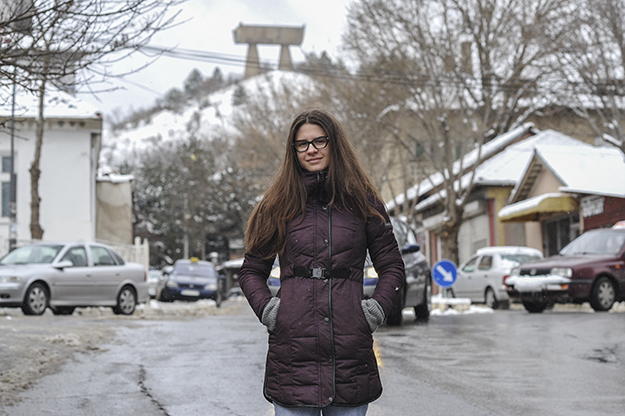
Photo: Atdhe Mulla / K2.0.
Milica Andrić Rakić
Profession: Journalist (Kossev)
From: Zubin Potok
Personally — but I do really feel like this reflects the opinion of many — I feel conflicted about the possibility of territory exchange. I don’t think there is a person here that would say, “No, I would not like to have Serbian institutions functional here,” and [would not want to] redo the Brussels Agreement and bring things back to the period prior to 2013.
However, as with other people here, I do feel like if there ever was a time to do this, 2013 was the time, because we basically had only Serbian institutions here — we did not belong to the rest of Kosovo, no decisions made in the government in Prishtina had any legal effect on our lives here.
As of 2013, and the Brussels Agreement, this is no longer true. Many people depend on Kosovar institutions as well now, almost half of them are integrated, only the education system and the health care system remain functioning in the Serbian system. This would require a period of reintegration into Serbian institutions, it might also imply violence — especially in Mitrovica.
I think that up to 2013 the majority of people here thought that at one point it would be absolutely clear that this part would be Serbian, and the rest would be Kosovo.
"Politicians have basically trodden us down, so we are beaten and we are at the point where we will accept anything just for this to finally be over."
Milica Andrić Rakić
After years and years of upheavals and pointing in different directions, I don’t think that people here have any more energy for major changes. At this point I think that the community is so exhausted that they will accept any solution. However they present it.
Any solution other than one that implies violence I think would be ultimately accepted by the community, because I think they — by “they” I mean politicians, both in Serbia and in Kosovo — have basically trodden us down, so we are beaten and we are at the point where we will accept anything just for this to finally be over.
The people of the Preševo Valley are not being asked whether they are able to comply with [the practical aspects of border correction] because it is not really about the people, it is about the Serbian and Kosovar governments and what kind of deal they can make that will ensure that the Kosovar independence is recognized, while making it possible for Serbia to do so without a huge political upheaval in the country.
It’s been a long time since people here have been asked what they want. Had people been asked back in 2013, they would never have accepted the integration into Kosovo’s institutions. But one major thing, and I think this is the single biggest mistake by the Kosovar government, is the perception regarding the Association of Serb Majority Municipalities.
Because these issues of health care and education systems were the first real risks, those were the red lines for people in the Serb communities in Kosovo [in terms of integrating institutions], particularly because of practical issues: We feel it’s scary, the idea of having to go to the doctors and paying. [Under the Serbian system] you still pay, but it goes out of your salary and you don’t really think about it — it’s a big difference to then pay for private health care.
We’ve always said that there should be a body that could coordinate and would easily establish a health care system where you would pay [in a familiar way] — so that this institution would still be basically similar to what would happen in the Serbian system, and not break Kosovo laws.
"People here are too tired of staged political incidents — I’m afraid that if there's any whiff of violence people would simply just pack up and leave."
Milica Andrić Rakić
And also the pressure would be on Serbia, because once the Association of Serb Majority Municipalities was not working, Vučić had an argument, he said: “You see, we agreed on something, they don’t want to implement it, I can’t speak to these people, I need something more, I’m not going to give you recognition for something I have already negotiated.” This is how he managed to make Kosovo look unreliable, and not really ready to deal with the Serb community.
I think that this was the single biggest mistake by Kosovo’s negotiators. Not forming the Association is what has led us to this situation in which Vučić can demand something more, because he has managed to come from a situation in which he signed the Brussels Agreement, which was basically a resolution that would just have needed to get through the parliament, to this place where everyone says: “Yes, OK, but Vučić has to be given something to finish this.”
People here are very tired, especially in the north — whenever people need a higher rating, they come here. So, whether it’s the arrest of Marko Đurić [in 2018], or they are sending the train [from Belgrade toward Kosovo in 2017, with “Kosovo is Serbia” written on the side in 21 languages], it’s always something.
Last summer, we had these rumors that there might be staged incidents that would put this scenario into force [and forcibly make] this exchange [of territories] happen. My fear is that people here are too tired of staged political incidents and I’m afraid that if there is any whiff of violence people would simply just pack up and leave — they would leave their homes, and I don’t think anyone would consider going back.
Back in 2011, when the Kosovar police special forces tried to take on the border posts to impose the trade embargo, and then Serbs started making barricades, you would also had those air raid sirens, and when people heard them, they would all go out to check what was happening, feeling a sense of danger.
The last two times these air raid sirens occured in Mitrovica, it was for the arrest of Marko Đurić and the attempted arrest of Milan Radojičić [in 2018] — and nobody really came out — we don’t want to be part of it, we don’t believe in these signals. People don’t want to be part of political shows, and they have simply given up.
That’s why I’m saying that the next time, if any plan that they have involves a security incident where they rely on putting on air raid sirens and Serbs coming out and putting up barricades, that’s not going to happen — they are going to leave their homes and run, because nobody really wants to be part of any scenarios any longer.
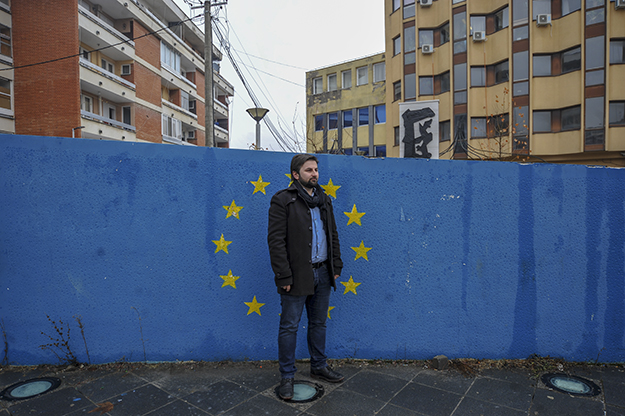
Photo: Atdhe Mulla / K2.0.
Liburn Mustafa
Profession: High school sociology professor
From: Presheva
After years of dialogue and discussions between the state of Kosovo and the state of Serbia, the two parties have reached a point where “normality and peace are possible only if the two parties discuss the redrawing and correction of state borders.” I am referring to the position of the international actors, namely the EU and the U.S., that the two parties must find a language of compromise and move past the frozen conflict, so as to achieve reciprocal state recognition.
Moreover, I’m considering the position of President Vučić, that the time has come for an ultimate solution for Kosovo, and especially the statements of President Thaçi, who in accordance with this [potential future] agreement, sees the Presheva Valley as a central and unavoidable issue. President Thaçi has stated that border correction does not imply the division of Kosovo, but rather the unification of the Presheva Valley with the Republic of Kosovo.
Referring to all these factors, we can say that Albanians in these parts have never been closer to realizing their long-standing ideals of uniting with Kosovo. So, among us we are witnessing an unprecedented enthusiasm, because the prospect of uniting with Kosovo is very close and possible.
Albanians of the Presheva Valley have expressed their political will in different time periods, whenever it was sought from them, through some of the most important political acts. To illustrate this, I want to highlight the multiple protests, demonstrations, strikes, and the participation of Albanians from these parts in the last two wars. Specifically, I want to highlight the referendum of March 1 and 2 [1992], when Albanians from these parts expressed their willingness to unite with Kosovo. So their will was expressed in natural forms, and not as a reflection of some other region or community.
"I can’t say that the idea of border correction is the most appropriate and most suitable for Kosovo and Albanians in general, but currently it is the most reasonable."
Liburn Mustafa
But if we have to accept a territory exchange between Serbia and Kosovo, because that is the most that can be achieved in these political constellations, considering that each of the two parties must give something up to win something, I think this should be decided by pan-Albanian politics and the general state and national interest, because such a thing cannot be decided solely by Albanians of the Presheva Valley, due to their ambitions for uniting with Kosovo.
Based on the positions of the two parties and relevant factors, we’ve not yet had access to any details, scenarios or plans that outline the future borders between Kosovo and Serbia. But it’s worth mentioning that every citizen of this region believes that the region should be unified with Kosovo with its popular and territorial compactness. Tendencies to fragment the region will not be accepted.
I can’t say that the idea of border correction is the most appropriate and most suitable for Kosovo and Albanians in general, but currently it is the most reasonable if we manage to preserve vital development assets of the state of Kosovo. We currently have the idea of border “correction” and the “Association of Serb Majority Municipalities in Kosovo,” which is seen as very damaging, because such an idea foresees executive competencies for the Serb community in Kosovo, and implies political and territorial autonomy for Kosovo Serbs. This means that in the future we will have a much more powerful Serb community, and no one can guarantee that this community will not demand secession from Kosovo in the future.
Also, based on current migration trends in the Presheva Valley, we can say that in a few years, the Albanian community in Serbia will be borderline inexistent, which implies that in the future we would conditionally lose both parts.
If this initiative ends without the unification of the Valley with Kosovo, it would be a huge disappointment for Albanians from these parts, and it could result in further migration of citizens from this territory, because the pressure and systematic discrimination by the Serbian state has become unbearable. But if they agree on some other idea besides border correction, we hope that they will foresee similar rights for Albanians of Serbia, as for Serbs of Kosovo.
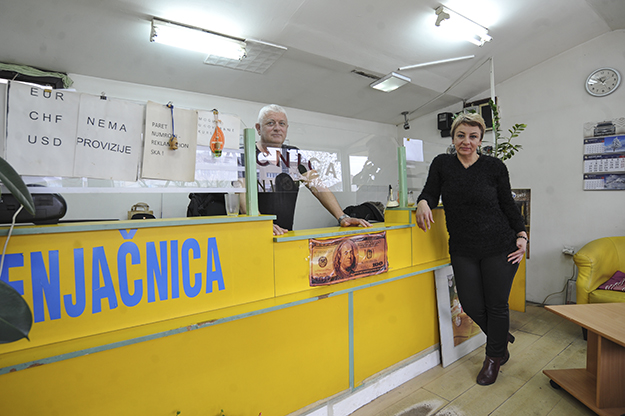
Photo: Atdhe Mulla / K2.0.
Suzana & Zoran Stojković
Professions: Unemployed agricultural engineer (master’s level)/ businessman. (Both currently working at their private currency exchange office.)
From: Presheva
Suzana: For us in general, Serbs in Preševo, what would moving the border change? We are living alongside Albanians, my neighbor is an Albanian, my neighbor over here is an Albanian, the neighbor down there is an Albanian, we are all, generally speaking, mixed with our neighbors, with people we work with, we are all working in this environment where the surroundings are mixed.
My opinion on any land swap is negative. These are lies by the leaders on both sides. According to what I have read in the Constitution of Kosovo and the obtention of Kosovo’s independence on the basis of its borders from 1999, the borders cannot be changed. There is no possibility, if an exchange of territory or a displacement of borders happens, then Kosovo loses its independence. My opinion is that this won’t take place.
I’m not afraid at all about where I live, whether it’s Kosovo, whether it’s Serbia or however you want to call it — I want to have my rights, the right to live, to work, to move freely — I haven’t been denied this previously, so I hope it wouldn’t be denied to me even then.
I have an issue now in my country, even though I’m a Serb, I cannot find a job in my country. I finished two faculties, a major, and I sit around without a job. Because in Serbia, one needs to be politically suitable in order to get a job, not to have certain knowledge and capabilities. Hence, if we enter a situation in which we merge with Kosovo, perhaps they will need capable people.
I wouldn’t want somebody to displace me from here, they can do as they like, but I’m not leaving. There is not a force in the world to displace me from here, that I have to go to Mitrovica, that somebody else comes here — this will not happen.
Zoran: Kosovo would never have asked for secession from former Yugoslavia or Serbia had it prospered together with Serbia. It was intentionally left to be poor, and when one is poor, one has to complain.
For example, I know of Gnjilane [Gjilan] when I was young in former Yugoslavia, Gnjilane was totally underdeveloped, they had one tobacco factory, the streets were empty, just like Preševo now. And now, Gnjilane is full, developed, buildings have been built and all that, which means that a lot was invested after that.
When a mother throws away her child, when the child grows up, it needs to manage by itself. This happened with Kosovo. Serbia threw it away, and now they are asking for it back — well, no way, my friend!
The most regretful thing is that poor people died for Kosovo, they were the victims. Who will be thrashed? The poor person. Those who are wealthy and powerful, whether Serbs or Albanians, they are all now engaged in politics and government.
Suzana: That’s true, and politicians always come to any town during elections, for Kosovo I have no idea, but here everybody from Serbia comes — officials, their state secretaries — and lies to the people: “Vote for me and you’ll get this, vote for me.” And then they never come again until the next election. They leave their phone number and then never answer the phone.
"There is no single ethnically pure state. Why should we be an example of one? Instead of being a good example of economic development."
Suzana Stojković
Zoran: Do you know what the best solution is for the status of Kosovo, for the status of entire Yugoslavia, how to solve the issue? A confederation of some sorts, “every man for himself, but all together.” Now, for example, we say “Kosovo is Serbian.” I stand by that, it is Serbian. Serbs lived there, Serbs died, Serbs fought wars, but then our Albanian brothers came along, they inhabited the area, now they live there.
Since they are the Albanian majority population, you let them make decisions for their territory, but as part of one Yugoslavia. Call it as you like, a joint federation. We would all join Europe together. Yugoslavia was a part of Europe. Let’s open up borders. Sign one 30-year deal, let it be so.
You see, if Serbia is that strong of a state, why do they complain about Kosovo introducing the 100 percent tax? Shut up, start exporting to Macedonia if you are that strong — but they can’t, because Belgrade businesspeople are the ones who export and import, they are in charge.
Suzana: After the 1999 bombing, when everything finished, Serbia was the first one to introduce a customs regime on Preševo, at the Mučibaba crossing. We established our own border and after that we say, “Kosovo seceded.” What do you get from that? You put [the border] there yourself. Why did you put it there? Kosovo introduced the customs a couple of years after that.
And second, if Serbia believes Kosovo to be part of its territory, why doesn’t it recognize university diplomas from Prishtina? I had an Albanian friend who has passed away now, his daughter completed her medical studies in Prishtina. Since we worked together in the office, he said, “Please ask around about how to validate a diploma.” On the webpage of the Coordination Authority, there is a reference for validating Kosovo diplomas. I dialed the phone number to ask about it: “It can’t be done.” If Kosovo is Serbia, why won’t they recognize the diplomas?
And another thing. Who can guarantee us that you are a pure Albanian or that I am a pure Serb? For 500 years the Turks ruled this place, they took the most beautiful women, had children and left them.
Zoran: As one Bosnian guy said: I was born a Muslim, but I know that my great grandfather was a Serb… He knows who he is, he was born, he visits the mosque. Now, go to the mosque, and be good.
Suzana: We should all respect our own religions. You be a good Albanian, I’ll be a good Serb, let’s respect each other. There is no single ethnically pure state. Why should we be an example of one? Instead of being a good example of economic development.
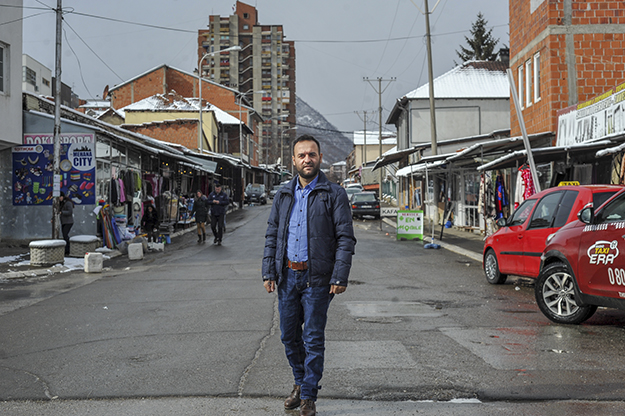
Photo: Atdhe Mulla / K2.0.
Emir Azemi
Profession: Former deputy speaker of the Municipal Assembly of North Mitrovica
From: North Mitrovica
Initially, the matter of exchange of territory for me — but I believe also for the people in the north — remains a matter of speculation since it has not yet been formally presented by the parties involved in the process. So it is difficult to get a stand on this issue, but as a citizen — but also as a connoisseur of the political issue in the north — we are following the issue of territorial exchange with concern, because we do not really know what this exchange is! But it is clear that the people in the north are against the border being drawn at the Ibër River.
The security situation has improved considerably for several years now. There is a freedom of movement and coexistence among communities. Albanians need to be more supported in the field of employment, construction and return to their properties, although during these years there have been positive developments in this regard.
An Association [of Serb Majority Municipalities] with executive power would be a cancer for the Republic of Kosovo and it would be an internal division. Kosovo needs to make a clear analysis of what its interest is, and between the two evils it should choose the smaller evil. Kosovo needs to see its political, economic and strategic interest — as well as the international one — before signing a final agreement.
The abolition of Resolution 1244 and UN membership completes the state of Kosovo. Serbia and Kosovo must end the century-long conflict with a peace agreement acceptable to both our states and nations because this is a long-term mutual interest. Any agreement must be legally binding.
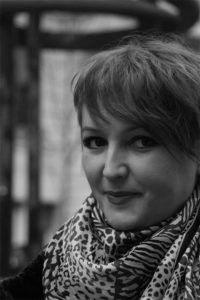
Photo: Atdhe Mulla / K2.0.
Miljana Dunđerin
Profession: Artist / Director of ‘Aquarius’ cultural center
From: North Mitrovica
Kosovo — or Kosovo and Metohija as we Serbs call and perceive it — has never been daily politics, but an issue that goes deep into the historic, spiritual and cultural being of multiple ethnic groups that have lived in this territory for centuries. With time, every objective and honest person has to notice a few different cultures, languages, identities — primarily Serbian, then Turkish and finally, in recent history, Albanian — each trying to wipe out and dominate the other, and every time these efforts are unsuccessful: They all end up mixing into the richness of this beautiful place.
This is not a myth — Our Lady of Ljeviš and Sinan Pasha Mosque can be touched, they are real, they exist, one next to the other, in the same city [Prizren]. I think that any exchange of territories would endanger the personal, cultural and spiritual identity of the ethnic groups living in this territory.
However, another thing is crucial to be said regarding this topic. The fate of Kosovo — and Metohija, as we say — cannot be decided by people with expiration dates, especially not the ghosts of the past. To come to any solution, first and foremost, the Serbian and Albanian intellectual, cultural, scientific elite have to start talking, using arguments and respecting the different point of view of the other. Talk about everything — freely. These talks need to include the religious communities as well — Orthodox, Islamic, Catholic. This is a long and difficult process.
"Neither Serbs nor Albanians decide their own fate for more than two decades, partly because they do not communicate with one another."
Miljana Dunđerin
People’s opinions here are divided, mostly given to them from Belgrade, Prishtina or different foreign power centers. People who are willing to state their own opinion are rare.
We are too small to be free. This is why both Serbs and Albanians have, for a long time, been puppets on strings pulled from Belgrade and Prishtina, but also from big world capitals: Brussels, London, Berlin, Washington, Moscow.
Neither Serbs nor Albanians decide their own fate for more than two decades, partly because they do not communicate with one another. This is why the fate of the people who live here — be they Serbs, Albanians, Bosniaks, Gorani, Roma, Jews — will be decided in other power centers that do not know their mentality, cultural and spiritual heritage, nor the real struggles the people here have suffered for centuries, together, living and surviving.
Who owns this place has never [depended] and will never depend on who governs the territory, but to what extent our souls carry every inch of this land. Those who have the “genome” of the cultural and spiritual heritage and can pass it on to other generations, they are the owners of this land. Maybe Kosovo really is the second Jerusalem.
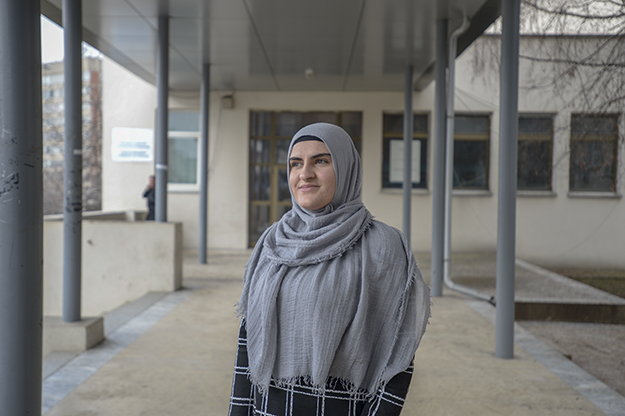
Photo: Atdhe Mulla / K2.0.
Medina Qerimi
Profession: Political science graduate
From: Presheva
The subject of territorial change has been discussed in Presheva since the Yugoslav era. The desire for unification was also expressed in 1992 through a referendum, in which the Albanians from the Valley voted unanimously in favor of this [union] — but the Serbian state ignored it. The desire of citizens to join Kosovo resurfaced later as well.
In 2001, after the conflict [in which an ethnic Albanian insurgency attempted to secede three majority-Albanian municipalities from Serbia and join them to Kosovo], when Presheva failed to achieve its goals, an integration process began with the help of the international community. But this integration process failed and remained solely on paper, while young people began to emigrate in large numbers to different parts of the world.
Albanians in Presheva have many problems — for example in terms of education, Albanian students still do not have books in the Albanian language, or for example there is no hospital and we have to travel to Vranje for health care.
"For me, it is most important to have freedom of education in Presheva and to use books in the Albanian language, whether Presheva were to be in Kosovo or in Serbia."
Medina Qerimi
Though the idea of unification [with Kosovo] has always been welcomed, it is now a problem because we do not know the details. For example, while Presheva is mainly inhabited by Albanians, Medvedja is mainly, and Bujanoc is partly, inhabited by Serbs. So, while Presheva would automatically become part of Kosovo, the other two cities are at risk of remaining in Serbia. And that would be pointless.
I’m personally in favor of this idea, but it’s most important [to consider] the youth. For me, it is most important to have freedom of education in Presheva and to use books in the Albanian language, whether Presheva were to be in Kosovo or in Serbia.
It would also be problematic to give up a passport that enables us to travel to the EU and many countries around the world. For example, I have traveled to many places. But if Kosovo gets the [visa] liberalization, we would rather choose to unite [with Kosovo]. But, beyond these benefits, Valley Albanians have problems, and most of them would support the exchange.
I think that the Serbs themselves are divided and have different opinions. For those who are not involved in politics, who are ordinary people, more social, [the territory exchange] would not be a problem. But, there are those who are more nationalistic and if you were to say such an idea to them, you could pay for it.K
These words, formed from answers to questions, have been edited for length and clarity.
Feature image: Atdhe Mulla / K2.0.







